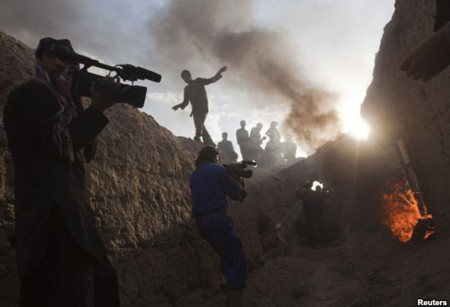By Frud Bezhan

A cameramen at the filming of an Afghan feature film in the village of Sarai Khuja, north of Kabul, in June 2011. (Photo: Reuters)
Gray desert surrounds the camp, a forbidding compound of watchtowers, mud walls, and razor wire.
Beyond the iron gates, dozens of makeshift tents dot the sands inside the compound, where hundreds of refugees -- men, women, and children -- lie in human excrement and other filth.
This ominous setting provides the backdrop for the film "Neighbor," which portrays the alleged massacre of hundreds of Afghan migrants at a detention center inside Iran in the 1990s.
In the film, Iranian guards abet the massacre of some 600 Afghan inmates at the Safed Sang (White Rock) detention facility after they protest their treatment. Iranian warplanes finish off the detainees by strafing them with machine-gun fire.
The Iranian authorities have never permitted an independent investigation of what actually happened at Safed Sang, so the facts of the case cannot be verified.
But those who escaped provide chilling testimony.
To acclaimed Afghan film director Siddiq Barmak, who produced "Neighbor," it was a story that needed to be told.
But he says the Iranian authorities have mounted a determined effort to prevent the film from gaining wider distribution in Afghanistan -- with a measure of success so far.
The scheduled premiere of "Neighbor" at a human rights film festival in Mazar-e Sharif earlier this month was canceled after protests from the Iranian Consulate, which labeled the film "un-Islamic."
Similar objections were voiced in Kabul, where Barmak says the film was briefly screened and warmly received by the audience. "Everybody was appreciative of the film and they welcomed it," he says. "It had a huge impact on the audience."
But the filmmaker says he has had no luck gaining wider distribution. "We took the screening of the film...to a few private TV channels in Kabul," he says, "but unfortunately at the last minute they refused."
Again, Barmak sees the hand of Iran in those rebuffs and says the attempted censorship of the film sets a dangerous precedent.
Sensitive Topic
[utube]XH14GIDqWAk[/utube]"Neighbor," completed earlier this year, was made on a budget of just $50,000. It follows the plight of Omar, who is trapped at the Safed Sang detention center in Iran with his sick wife and two daughters.
The film depicts the daily trials and humiliations the family faces at the hands of the brutal Iranian guards, who abuse, torture, and force the detainees to work.
Daud Azimi was one of the few refugees who managed to escape and survive the atrocity that day. He recalls how he fled to the surrounding mountains with his wife and child after the camp was overrun by Iranian forces. The rest of the inmates, Azimi says, were either killed by guards or subsequently buried alive in mass graves near the camp.
"The guards started shooting at all of us," Azimi says. "In the chaos that followed, people were trying to hide and others were running away toward the mountains leading back to Afghanistan."
More than a decade later, Azimi is reliving the traumatic experience as an actor in "Neighbor."
"It feels strange, but I chose this role," he says when asked about his role as an Iranian guard. "Now I have the opportunity to show the world what they did and how they treated us."
Dangerous Precedent?
The controversy surrounding "Neighbor" comes as another Afghan film was barred from screening this week in Kabul.
The premiere of "Madrasa," based on the true story of a young female Afghan refugee in Iran, was suddenly canceled at the French Cultural Center in Kabul.
"Madrasa" follows the story of 8-year-old Meena, who is prevented from attending school by officials in Iran. She dreams of becoming a doctor but anti-immigrant laws prevent her from getting a good education.
Asad Sikandar, director of "Madrasa," says the Afghan authorities prevented the movie from being shown based on a request from the Iranian Embassy in Kabul.
"The Iranian Embassy, together with Latif Ahmadi, head of Afghan Film, received notice not to screen our film," Sikandar says. "If they are saying that there is freedom, why don't they allow me to show my film?"
Members of the Afghan parliament joined Sikandar in condemning the actions of the government, asserting that the decision to ax the film was a violation of free speech and press freedom.
But during a parliamentary session on October 15, Information and Culture Minister Sayyed Makhdum Rahin denied Sikandar's claims, insisting the government had played no role.
Microbudgets
Although Afghan cinema has made impressive strides in the past decade, director Barmak says it faces huge challenges. He says the national government must recognize the value of cinema and allocate sufficient funding to boost its growth.
"A lot of young talented filmmakers who are rooting for help from places, especially from the government, they don't receive any help," Barmak says. "Now they are making short films with $100 or $200."
In a country where most of the population remains illiterate, Barmak says cinema can play an important role in slaking ordinary Afghans' thirst for information and education -- even when the truth is bitter.
"A lot of people were saying that it was our responsibility to make this film," he says, "that it is the responsibly of our cinema to tell these kinds of stories to our nation."
Originally published on Oct. 21, 2011



